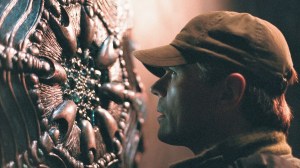Reki Kawahara’s Sword Art Online is one of the most popular light novel series running today, and became such an anime smash hit that it inspired a whole host of new Isekai series when it first debuted. But it’s not without its problems.
Videos by ComicBook.com
One of the major complaints fans have had about the series is its use of sexual assault in order to characterize a villain, and Kawahara recently noted how he wants to now write stories that treat his female characters less like prizes to be won.
In a recent interview translated by @Frog_kun on Twitter, Kawahara noted that “after going to overseas fan events, he has come to realise that he should write stories with ‘political correctness’ in mind.” With that in mind, Kawahara says he’s “been trying to give the female characters more agency” and “that it is wrong to treat them as trophies.” While fans of his series note that there has yet to be a major change from this, the trend in terms of his female characters losing agency begins relatively early on.
One of the criticisms fans had of the first season of the series is that after the Aincrad arc (and arguably midway through it), Asuna takes a backseat to Kirito and is literally turned into a damsel in distress. This goes one further as her captor begins to touch and threaten her inappropriately as she becomes a piece of property to be won by Kirito. This was a far cry from Asuna’s original introduction as a skilled swordswoman.
Although there have been strides in some areas in Sword Art Online, such as the Mother’s Rosario arc, the women in the series have struggled a bit to form identities. Alicization sees the introduction of many fan-favorite female allies and villains, but it’s also the arc that kicks off in full due to a sexual assault. It had such an intense portrayal in the anime, that Kawahara himself even apologized to the actors following the premiere of the episode featuring cede assault.
Kawahara has explained in the past that he included plot elements such as sexual assault because stories he read in middle school contained those kinds of elements. Now that he’s grown as a storyteller, however, he’s begun to offer different means of catharsis and tension. While it might not quite be reflected fully in the series yet, there have been improvements throughout that align with Kawahara’s drive for “political correctness.”








